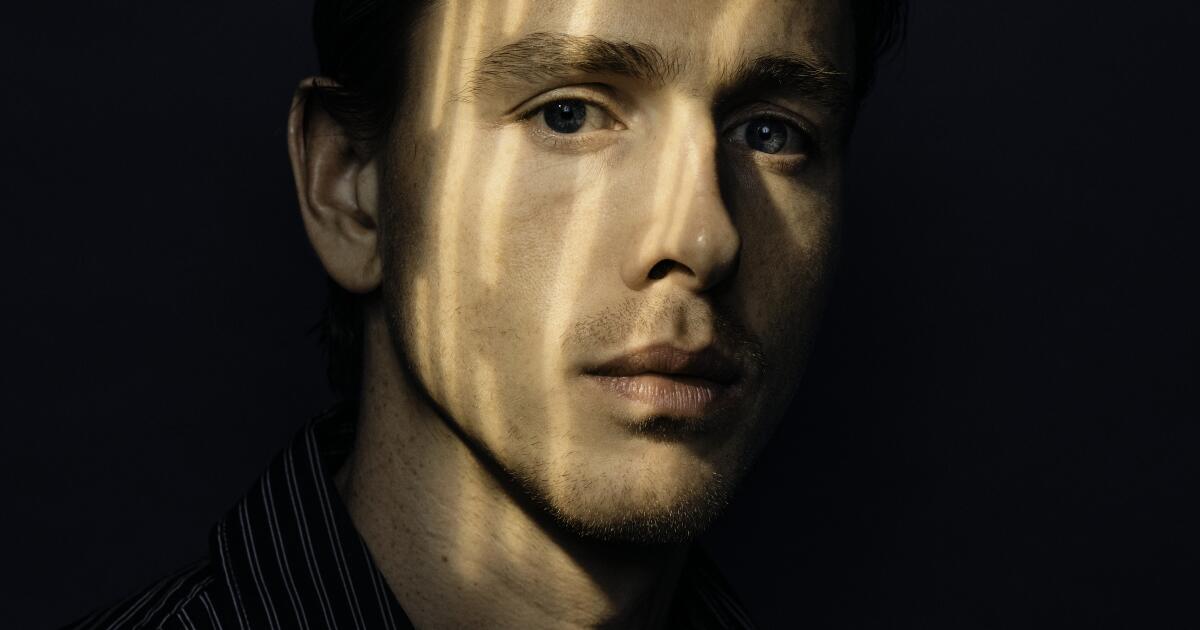London — Before being cast in Halina Reijn’s “Babygirl,” Harris Dickinson had never worked in an office. He’d done retail and hospitality before becoming an actor but wasn’t fully prepared to play Samuel, an intern at a New York City tech company who becomes embroiled in an illicit affair with its chief executive, Romy (Nicole Kidman). To prepare, he spent time in a fashion office and went into A24, where the film actually shot many of its scenes.
“I’ve never been in that world,” Dickinson recalls. “I’d done all types of jobs before I started acting, but the office environment was not one of them, so I really didn’t have a clue. There’s a romanticism to it. Acting has such a weird structure, whereas the office is so structured and so contained and very clear. There was a sexiness to it for me.”
Despite that tangible preparation, Samuel held “an element of mystique” for Dickinson, who created his own backstory for the character. When he was approached by Reijn about the role, Dickinson was uncertain because Samuel seemed so untethered and undefinable. So much about him was left unsaid in the script, a fact that was both intriguing and terrifying.
“I was fascinated by the writing and the character because I didn’t really know what I would do with it,” Dickinson says. “It scared me a little bit, in the sense of ‘I don’t know how exactly best to do this in a way that’s going to elevate the rest of the story.’ But I guess that’s why it eventually led me to do it.”
Once he got on set with Kidman, much of that fear dissipated. A scene where Samuel dances shirtless to George Michael in a hotel room was daunting, certainly, but the actor says he had no choice but to embrace the moment. The film contains long, uncomfortable scenes between Samuel and Romy, in which they explore the power dynamics of their sexuality and confront their own boundaries. The actors got help from an intimacy coordinator, and Reijn encouraged a sense of freedom, allowing scenes to play out in a way that felt boundless to Dickinson.
“We would do scenes where there were no rules,” he says of the shoot. “Ultimately, it’s about two people dealing with the present moment more than anything. [It’s about] their confrontation with their own ideals and desires. So you start seeing [a scene] in one way, and then it goes in a different way, and then it ends in an extremely different way.”
If that sounds intense, it was. But it was also immensely enjoyable — the main reason Dickinson says he became an actor.
“It wasn’t a rigid environment at all,” he says. “That creates something quite loose and playful on set. It manufactures something more interesting, rather than if there are really strict or scary environments, which can sometimes be the case.”
Samuel toys with the level of control between him and Romy, often forcing her into situations that are unexpected. Dickinson wanted to play Samuel with a genuine air of uncertainty. It’s a relationship that pays homage to iconic erotic thrillers while undercutting what’s expected from the genre in a way that forces the viewer to confront conceptions about gender, power and sex. Dickinson describes his character as someone who is simply “wading around in his own mess.”
“He fronts as an assured individual, and other times he seems completely unstable,” the actor says. “He’s just a young man trying to figure out what his masculinity means. Sometimes he wants Romy in a very simplistic way, and that’s what he’ll get. And then there are other times where it feels like he’s using it as his own experiment to understand himself and understand his desires.”
Before shooting “Babygirl,” Dickinson took on a small role in Steve McQueen’s “Blitz” as a firefighter battling the aftermath of the German air raids during World War II. He wanted to work with McQueen, as well as star Saoirse Ronan, with whom he’d previously co-starred in “See How They Run.” “I thought it was important, even if it was a small role,” he says. “I just pop in and out of it, but it was fun to be a part of a bigger canvas.”
Dickinson also recently completed his directorial debut, which he shot in England over the summer. The as-yet-untitled film is set against the backdrop of homelessness in the U.K., and it’s a story Dickinson has been developing for more than five years. In fact, he wanted to direct before he ever wanted to act, despite building an impressive career on film and TV in such award-nominated projects as “Triangle of Sadness,” “The Iron Claw” and “A Murder at the End of the World.”
“As I started to get older and act, I realized I was suppressing that desire to make stuff as well,” he notes. “It was there, bubbling away. I love being on film sets. I love being a tiny piece of the puzzle as an actor. But I also have a huge desire to be the one building the puzzle.”

